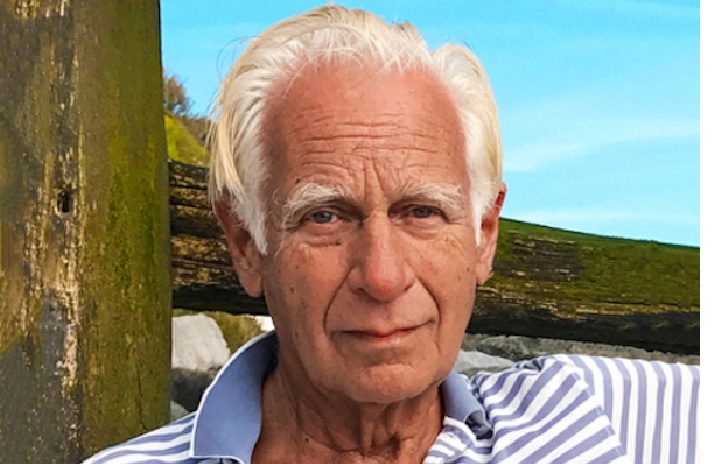Craig Sams has a way with words. A consummate communicator, his words and those of others, he wields with a certain élan and flourish. He’s not bad with the iconic image either.
At the outset of his talk “Go For Gold By Being Green” delivered on September 22 in the Methodist Chapel, Church Square as part of the Rye Festival, he traced his development from a Nebraskan boyhood to his “Living Legend” status in the Chocolate Hall of Fame courtesy of his time with Green and Black’s.
His adroit use of an iconic black and white pic of Joni Mitchell not quite getting to Woodstock and her lyric allegedly penned en route struck a finely tuned harmonic with the generation comprising the bulk of the audience,
“We are stardust, we are golden
We are billion-year-old carbon
And we got to get ourselves back to the garden”
Resonating with his business Carbon Gold and areas of interest and concern, he grounded his talk in science with an allusion to the average body’s chemical make-up of 30/40lbs of carbon, Fred Hoyle’s theories of Stellar Nucleosynthesis or Nucleogenesis and the speculative Lithopanspermia hypothesis.
The resulting contention is that over millennia, fungi and microbes interacting with sugars and mineral nutrients, through cycles of death and decomposition created carbon in the soil metres deep.
Quoting the poet Wendell Berry, Sams traced the depletion of carbon in the mid-west soil of his great-grandfather’s farm in 1885 (100%) to the 20% when he was born in 1944 and currently closer to 10% and dependent upon fertilisers and pesticides. “We didn’t know what we were doing because we didn’t know what we were undoing,” he said.
Examples of the result were the great Mississippi floods of 1927 when floods 60 miles wide covered farms from April to October prompting a northern migration and the Dust Bowl in the 1930s where ‘Okies’ were displaced from Oklahoma, Kansas and parts of Nebraska. All illustrated by those familiar stark monochrome images of the damage inflicted on the environment.
Referencing EB Balfour, author of The Living Soil and what became known as organic farming and her collaborative activities with Dr Innes Pierce in the Peckham Project working on nutrition and hygiene, Sams noted their founding of The Soil Association of which he would become Chairman. His interest seemed to have developed from that point in a more expansive and inclusive way.
Sams was introduced to Taoism and Zen Macrobiotics and in London in the 60s sold books and brown rice snacks. He and his brother opened restaurants in Notting Hill and Bayswater. In the 70s came ‘Harmony’ and a range of macrobiotic foods which in turn became ‘Whole Earth Foods’ and its subsidiary Green and Black’s in the 90s.
His journey getting himself back to the garden has involved a determination to have his enterprises providing and distributing food to be carbon neutral and his interests seem to have evolved into a more general preoccupation with sustainable environment, climate change and greenhouse gas removal.
Carbon Gold Ltd, which he founded in 2007 and where he is Executive Chairman, is his current project and involves the promotion of Biochar.
Biochar, charcoal made from wood byproducts is a carbon-rich substance which has beneficial effect of revivifying soil and replacing carbon and it is sold by his company, or as Sams said: “You can make money out of thin air and it does grow on trees.”
Biochar is plant matter roasted until it’s black and crumbly like a cross between humous and charcoal which when buried in the soil stores carbon, so it doesn’t enter the air as carbon dioxide contributing to global warming.
It lasts a long time in the soil, it increases microbes in the soil, increases water retention and reduces the leaching of nutrients. It helps regenerate soils and cure diseases.
Organic farming is essentially carbon-neutral or carbon-reductive. At a governmental policy level an organic farm could be paid for an increase in carbon in the soil and charged for a decrease; agribusiness would have to do a major rethink.
As he airily put it: “Pay people for doing the right thing, tax them for doing the wrong thing.”
A fascinating, informative and well-attended talk with quality questions rewarded with bars of Green and Black’s Chocolate
Image Credits: Rye Arts Festival .




Thank you for such a comprehensive account of this excellent talk, for me a highlight of the Arts Festival. The names of Craig and Greg Sams are legendary in the environmental and wholefood movements and I feel honoured to have finally met Craig himself. His talk pitched high from the very start. He clearly fully understood the scientific complexities and explained them lucidly to a rapt audience, with fascinating tales of the environmental disasters in the Midwest and his own memories of family farms in Nebraska. A rare event, all credit to the Festival organisers for including it. Patrick Bonham, founder of Rye Wholefoods (1981), now Rye Health Store.